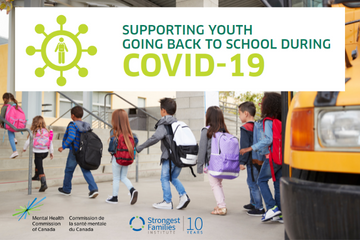As part of Canada’s Mental Illness Awareness Week (October 3-9, 2021), the Mental Health Commission of Canada (MHCC) and Strongest Families Institute (SFI) have come together to support young people heading back to the classroom amidst some particularly challenging circumstances – the new reality during COVID-19.
After more than a year of uncertainties related to COVID-19, physical distancing, virtual learning, homeschooling and schedule modifications, students of all ages may be experiencing heightened stress about the school year ahead.
Dr. Patricia Lingley-Pottie, President & CEO, SFI says a new school year brings both excitement and uncertainty for students and parents/guardians, but it can be particularly difficult as students head back to class after a prolonged period of academic change. For many, anxiety is at an all-time high.
“This transition will feel different for everyone and it’s important that we’re ready to engage them on their own terms,” says Dr. Pottie. “Never has it been so important to watch for deviations in student behaviour. If they appear unsettled and apprehensive or show changes in mood and social tendencies, these may be signs of declining mental health.”
Michel Rodrique, president and CEO of the Mental Health Commission of Canada says,
“As young students settle into a school year coloured by the change and uncertainty of the pandemic, they may struggle to find their footing. We are so pleased to have developed this resource with the Strongest Families Institute to help equip adults with the tools they need to support the youth in their lives, and set them on a path to success.”
Dr. Pottie advises parents and teachers to approach the topic casually opting for “side by side” conversations, listening without judgement, and reminding youth that it’s okay to feel uneasy – that they are not alone as many of their peers and even adults are having the same feelings. Keep the conversation going, show vulnerability or be open about your own feelings and let them know that you care.
“By listening and understanding, you can reinforce the message of resiliency and give them the confidence to face their challenges,” adds Dr. Pottie. “It’s important to catch these changes early, notice signs of persistent anxiety that are interfering with the student’s life and seek help to prevent anxiety and depression signs from getting worse. Equipping students with skills that promote good mental health early in life can lead to a healthier future.”
For a full list of “back to school” mental wellness tips, visit https://mentalhealthcommission.ca/resource/supporting-youth-going-back-to-school-during-covid-19/

